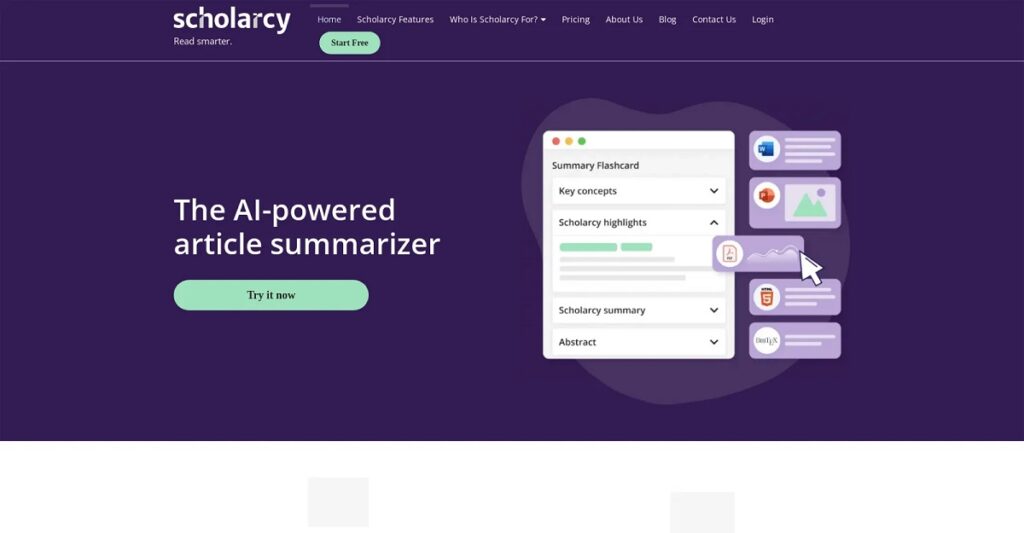[ad_1]
For centuries, the vaulted halls of academia have housed humanity’s most groundbreaking insights and discoveries. Yet, locked behind dense pages of technical writing and paywalled magazines, such knowledge has remained out of reach for most students and the public. Now a new AI platform promises to break down these barriers. Founded in 2020, Scholarcy has developed amazing machine learning algorithms that can instantly read and understand complex scientific papers in any field. Within seconds, the AI extracts and summarizes the most salient points in an easy-to-digest format that will one day open exclusive research to enthusiastic minds around the world.
Welcome the future: There has been democratized access to the vaults of academia. AI will release these treasures to advance human progress everywhere through shared knowledge, limitless by gates. Read on to discover how Scholarcy is leading this new enlightenment.
See more: Google delays Gemini AI launch until early 2024
Introduction
The number of scientific publications has increased explosively in recent decades. Researchers now produce more than 3 million new articles every year, spanning all disciplines. Keeping track of relevant publications has become extremely time-consuming even for experts.
For students and the general public, many important insights remain hidden behind paywalls and dense writing. Scholarcy was founded in 2020 to use AI to solve this problem and democratize access to scientific knowledge.
What is science?
Scholarcy is an innovative artificial intelligence platform designed to make academic research more accessible. Using advanced machine learning algorithms, Scholarcy can read, understand and summarize complex scientific articles in a fraction of the usual time, making knowledge accessible to a wider audience.
Scholarcy functions as an automatic tool for summarizing scientific articles. It uses natural language processing to read documents, extract key information and present abbreviated summaries with the most salient points. This allows readers to quickly understand the core essence of scientific publications and determine their relevance.

What are the possibilities of Scholarcy?
The Scholarcy platform uses breakthrough machine learning to deliver automated summaries of research papers through the following core capabilities:
Understanding complex documents
Scholarcy’s algorithms can understand academic publications in all fields, including highly technical writing with complex terminology. It breaks down linguistic components to really understand the meaning.
Identification of important information
The AI extracts sections that contain crucial details such as key terms, research methodologies, datasets, results, conclusions, limitations, and referenced sources. It determines the most salient points worth including in a summary.
Structured summary
Scholarcy presents the extracted information in a structured summary, organized into paper sections. This enables rapid scanning to quickly absorb critical details. Summaries contain important contextual references to the original document.
Summary Customization
Users can customize summaries by expanding certain sections of interest. References become clickable links to supporting documents for further research. Important key terms also refer to additional background information from Wikipedia.
Continuous AI improvement
Scholarcy uses supervised machine learning techniques. As users provide feedback on automatically generated summaries, the system continues to improve its comprehension and summarization capabilities over time. This creates a cycle of constant improvement.
Also read: Is Elon Musk’s Grok better than ChatGPT?
Benefits and use cases
By providing immediate summarized access to publications, Scholarcy offers many benefits:
Research efficiency
Scholars and scientists can increase their productivity exponentially by using Scholarcy summaries to determine the relevance of articles to their own research, rather than having to read entire documents. This enables quick filtering to locate the most relevant articles for thorough reading and reference, while ignoring irrelevant articles. Researchers can stay better informed while avoiding information overload.
Acceleration of students’ learning
Students can leverage Scholarcy’s AI capabilities to complete their assignments faster and increase their knowledge. Quick access to compressed summaries of scientific articles enables faster research, ideation and editing. Students also build understanding through Scholarcy’s definitions and background links.
Enabling public knowledge
Interested non-academics can use Scholarcy to explore publications from renowned thought leaders, research institutions and peer-reviewed journals. Without being burdened by technicalities or paywalls, anyone can now access, understand, and discuss important scientific and philosophical concepts, discoveries, and conclusions. This democratizes public access to important knowledge.
As AI capabilities continue to evolve, Scholarcy aims to reveal all scientific knowledge and knowledge to anyone who cares to seek it. The platform empowers students, researchers, professionals and lifelong learners to break past limitations so that everyone can benefit more from the vast wisdom of academia.
Conclusion
Scholarcy represents the next generation of platforms working to reshape the way people around the planet can tap into humanity’s vast wealth of institutional knowledge. The groundbreaking application of artificial intelligence has created new technological bridges between dense scientific publications and those who strive to obtain their insights efficiently.
Scholarcy already serves a large number of researchers and students around the world and continues to expand its automated summarization capabilities across scientific disciplines. Through continuous improvements powered by machine learning, the platform moves closer to its ambitious vision of unlocking the world’s knowledge to all who seek it. The goal of science is to ultimately enable anyone, anywhere, to easily inform themselves about academia’s most cutting-edge research and ideas.
🌟 Do you have burning questions about a “Scholarcy AI”? Do you need some extra help with AI tools or something else?
💡 Feel free to email Pradip Maheshwari, our expert at OpenAIMaster. Send your questions to support@openaimaster.com and Pradip Maheshwari will be happy to help you!

